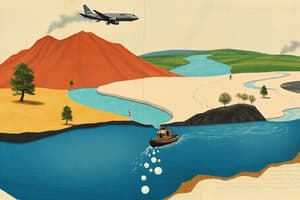Podcast
Questions and Answers
What drives the hydrologic cycle?
What drives the hydrologic cycle?
- Tectonic plate movement
- Wind patterns
- Solar energy (correct)
- Volcanic activity
Where is about 97% of the total water on Earth located?
Where is about 97% of the total water on Earth located?
- In oceans (correct)
- In lakes and rivers
- In shallow groundwater
- In glaciers and ice caps
What percentage of water on Earth is in the atmosphere?
What percentage of water on Earth is in the atmosphere?
- 0.001% (correct)
- 0.76%
- 2%
- 0.013%
What is the primary source of water for moving chemicals, sculpting landscape, and providing water resources?
What is the primary source of water for moving chemicals, sculpting landscape, and providing water resources?
What are the main components of the hydrologic cycle?
What are the main components of the hydrologic cycle?
Why are the rates of transfer of water from land to the ocean relatively low?
Why are the rates of transfer of water from land to the ocean relatively low?
What percentage of precipitation on land evaporates back to the atmosphere each year?
What percentage of precipitation on land evaporates back to the atmosphere each year?
In ecological research and biological conservation, what term is used to evaluate the hydrology of an area?
In ecological research and biological conservation, what term is used to evaluate the hydrology of an area?
What is the fundamental hydrologic unit of the landscape at regional and local levels?
What is the fundamental hydrologic unit of the landscape at regional and local levels?
How is a first-order watershed characterized?
How is a first-order watershed characterized?
What area contributes surface runoff to a particular stream or river?
What area contributes surface runoff to a particular stream or river?
At what levels are watersheds best categorized by drainage basin area?
At what levels are watersheds best categorized by drainage basin area?
What term is used to describe the distribution of water being far from uniform on land?
What term is used to describe the distribution of water being far from uniform on land?
Flashcards are hidden until you start studying
Study Notes
- The hydrologic cycle is the transfer of water from oceans to the atmosphere, to land, and back to the oceans.
- Approximately 97% of Earth's water is in oceans, 2% in glaciers and ice caps, 0.76% in shallow groundwater, 0.013% in lakes and rivers, and only 0.001% in the atmosphere.
- Solar energy drives the hydrologic cycle by evaporating water from various sources.
- About 60% of precipitation on land evaporates back to the atmosphere each year, and the rest (40%) returns to the ocean as surface and subsurface runoff.
- The distribution of water is not uniform on land, leading to various environmental and ecological effects.
- The fundamental hydrologic unit of the landscape is the drainage basin, which is the area that contributes surface runoff to a particular stream or river.
- Watersheds can be categorized by drainage basin area and the number of streams that flow into the main channel.
- Watersheds vary greatly in size, from less than a hectare to millions of square kilometers.
- Watersheds are named for their main stream or river.
- A watershed is important in evaluating the hydrology of an area and in ecological research and biological conservation.
Studying That Suits You
Use AI to generate personalized quizzes and flashcards to suit your learning preferences.




